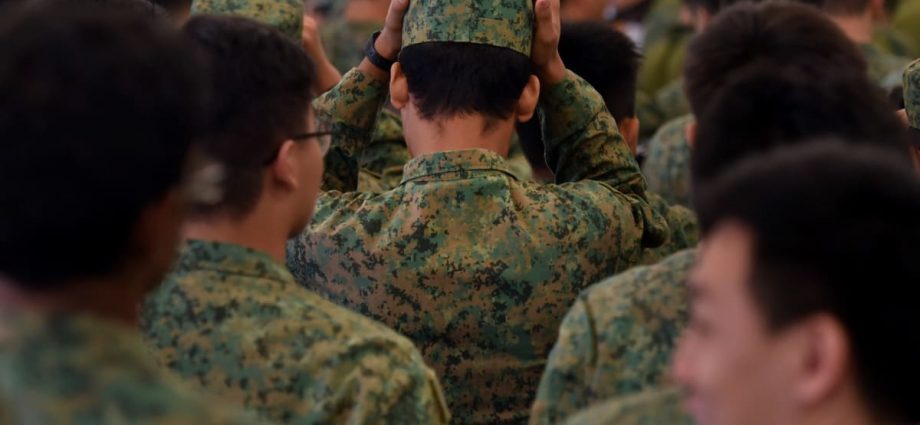
SINGAPORE: A Taiwan-born Singaporean was jailed for nine weeks on Tuesday (Aug 30) for defaulting on his National Service (NS) obligations.
Tsai Yi-hsuan, now 25, stayed outside Singapore for a total of almost four years and eight months without a valid exit permit.
He pleaded guilty to three charges under the Enlistment Act.
He told investigators that he did not approach authorities about his NS obligations each time he was in Singapore as he wanted to focus on his studies, according to court documents.
Tsai has since completed his full-time NS in the Singapore Armed Forces. He is the 19th man to be jailed since the High Court set out the sentencing framework for NS defaulters in 2017.
BORN AND RAISED IN TAIWAN
The court heard that Tsai was born in Taiwan in 1997. His mother and sister are Singaporeans, while his father is a former permanent resident.
Tsai grew up and was educated in Taiwan, according to Deputy Public Prosecutor Nicolle Ng.
He has held four Singapore passports, which he used to travel in and out of the country on 12 occasions. He would travel to Singapore to visit his maternal relatives.
Tsai had known that he held Singapore citizenship since elementary school. From the age of 16, he also knew that he was required to serve NS in Singapore as his mother told him so.
After Tsai turned 16-and-a-half in 2013, he received an NS registration notice at an old address in Taiwan that was owned by his parents.
Tsai’s family was not living at that address, but arranged for a security guard to collect their letters there and retrieved the letters on a monthly basis.
Tsai’s father handed the NS registration notice to Tsai after collecting it.
REGISTERED FOR NS
In May 2014, Tsai went to Singapore to register for NS and collect his identity card. He also updated his family’s address in Taiwan with the Central Manpower Base (CMPB).
Tsai was then found to have remained outside Singapore without a valid exit permit on several occasions from 2010, when he turned 13, to 2014.
Under the Enlistment Act, all male Singaporeans and permanent citizens aged 13 and above must comply with exit permit requirements.
When Tsai went to register for NS on Jun 3, 2014, the counter staff at CMPB reminded him to get a valid exit permit to stay outside Singapore.
CMPB also acknowledged Tsai’s application to defer NS for overseas studies and requested further documents to process this.
But two days later, Tsai left for Taiwan without a valid exit permit.
APPLIED TO DEFER NS
Later that month, Tsai’s mother submitted supporting documents for her son’s NS deferment.
CMPB replied asking for more documents, including further proof from Tsai’s school on his studies, and proof of overseas employment or business registration for Tsai’s parents.
When there was no response from Tsai’s mother, CMPB emailed her again about a month later to no avail. It followed up with a letter to Tsai’s updated address in Taiwan.
Tsai confirmed that he and his family stayed at the address at the time. But as he was preparing for university entrance exams and his studies took priority, he did not ask his mother about his NS obligations.
He next went to Singapore in September 2014 to attend his grandfather’s funeral, returning to Taiwan after five days.
On Oct 2, 2014, CMPB sent a letter to Tsai’s old address in Taiwan stating that his application for NS deferment could not be considered.
The letter also enclosed an order instructing Tsai to report to CMPB for his medical screening the next month, failing which he would become an NS defaulter.
Tsai did not report for his medical screening in Singapore.
On Feb 12, 2015, Tsai turned 18. He knew that he would be required to fulfil NS obligations upon reaching his enlistment age.
But he did not follow up with his mother, who was helping with his NS deferment, as he was studying, said Ms Ng.
Tsai remained overseas for the next few years, only coming to Singapore in April 2018 to perform rites at his grandmother’s tomb. He returned to Taiwan about a week later.
RETAINED SINGAPORE CITIZENSHIP
In October 2018, Tsai took the Oath of the Renunciation, Allegiance and Loyalty to retain his Singapore citizenship.
Tsai wanted Singaporean citizenship as he thought that housing and good jobs were difficult to find in Taiwan. He felt that he could have a bright future and start a family in Singapore, said Ms Ng.
But when Tsai was unable to renew his Singapore passport after that, his mother contacted the NS Call Centre.
In January 2019, an enlistment inspector informed Tsai’s mother that her son had committed offences under the Enlistment Act and was to report to CMPB in Singapore.
Tsai came to Singapore on Feb 7, 2019 and surrendered at CMPB the next day.
CONNECTION TO SINGAPORE
The prosecution sought the jail term imposed on Tsai, arguing that the objective was to preserve the core principles of national security, universality and equity affecting NS.
“The fact (that Tsai) had comparatively limited substantial connection to Singapore, by virtue of growing up and being educated in Taiwan, is not relevant to sentencing,” said Ms Ng.
On the contrary, Tsai was “clearly aware of and identified with his Singapore citizenship”, she argued, pointing to his preference for Singapore citizenship in view of the life he could build.
The mitigating factors were Tsai’s voluntary surrender and plea of guilt, added the prosecutor.
The Ministry of Defence previously said that it takes a firm stand against offenders, in response to past cases involving NS defaulters.
“If we allow Singapore citizens or permanent residents who are overseas to evade NS or to choose when they want to serve NS, we are not being fair to the vast majority of our national servicemen who serve their country dutifully, and the institution of NS will be undermined,” said the ministry.
The penalty for remaining outside Singapore without a valid exit permit is up to three years’ jail, a fine of up to S$10,000 or both.

